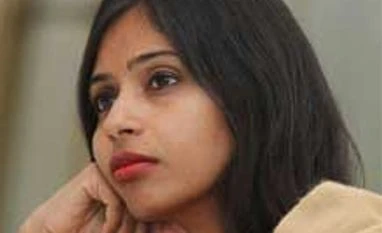Asserting that its demand after Devyani Khobragade's arrest is not unreasonable, India has said the case is not about mistreatment of a domestic employee but rather of US laws being gamed for immigration purposes.
"This case is about not the mistreatment of a domestic employee but rather US laws being gamed for immigration purposes," Indian Embassy spokesman Sridharan Madhusudhanan, wrote in a letter to The Washington Post.
India has been demanding the withdrawal of the case against Khobragade and an apology from the US for the treatment meted out to the 39-year-old diplomat, including a strip search and detention with criminals after her arrest on December 12.
"These include respecting Indian legal processes and affording our diplomats the same immunities and courtesies under the Vienna Convention on Consular Relations that the US government seeks for its officials posted abroad," the Indian diplomat said.
Madhusudhanan said the diplomat was the first complainant in this dispute, both in New York and in India.
"Additionally, the domestic worker's employment contract is partly with the government of India, which pays for her medical care, travel and significant portions of her salary and living costs. Therefore, any dispute should be resolved in an Indian court," he contended.
"It is surprising that a pre-existing legal case in India and Indian diplomatic initiatives have been ignored. This case is about not the mistreatment of a domestic employee but rather US laws being gamed for immigration purposes," Madhusudhanan said.
Refuting media reports that claimed in India, US diplomats have been stripped of their identity documents, he said those officials posted in consulates have been issued identity cards with stipulations similar to those their Indian counterparts receive in the US.
The US Embassy in New Delhi has not been deprived of security, the official said, adding that traffic barricades that blocked a public street have been dismantled, but the embassy continues to receive exceptional protection by the Indian government.
"If anything, security has been stepped up recently. However, securing immunities and privileges for US officials abroad is best done by respecting international conventions and according entitled courtesies in the US," Madhusudhanan wrote in response to the op-ed published earlier by Martina E Vandenberg, a pro bono human rights attorney.
Vandenberg, president of the Human Trafficking Pro Bono Legal Center, had argued that diplomats who commit crimes should not get a free pass.
"This case is about not the mistreatment of a domestic employee but rather US laws being gamed for immigration purposes," Indian Embassy spokesman Sridharan Madhusudhanan, wrote in a letter to The Washington Post.
India has been demanding the withdrawal of the case against Khobragade and an apology from the US for the treatment meted out to the 39-year-old diplomat, including a strip search and detention with criminals after her arrest on December 12.
More From This Section
India's demands are not unreasonable, Madhusudhanan asserted, referring to an op-ed published in the daily a few days ago.
"These include respecting Indian legal processes and affording our diplomats the same immunities and courtesies under the Vienna Convention on Consular Relations that the US government seeks for its officials posted abroad," the Indian diplomat said.
Madhusudhanan said the diplomat was the first complainant in this dispute, both in New York and in India.
"Additionally, the domestic worker's employment contract is partly with the government of India, which pays for her medical care, travel and significant portions of her salary and living costs. Therefore, any dispute should be resolved in an Indian court," he contended.
"It is surprising that a pre-existing legal case in India and Indian diplomatic initiatives have been ignored. This case is about not the mistreatment of a domestic employee but rather US laws being gamed for immigration purposes," Madhusudhanan said.
Refuting media reports that claimed in India, US diplomats have been stripped of their identity documents, he said those officials posted in consulates have been issued identity cards with stipulations similar to those their Indian counterparts receive in the US.
The US Embassy in New Delhi has not been deprived of security, the official said, adding that traffic barricades that blocked a public street have been dismantled, but the embassy continues to receive exceptional protection by the Indian government.
"If anything, security has been stepped up recently. However, securing immunities and privileges for US officials abroad is best done by respecting international conventions and according entitled courtesies in the US," Madhusudhanan wrote in response to the op-ed published earlier by Martina E Vandenberg, a pro bono human rights attorney.
Vandenberg, president of the Human Trafficking Pro Bono Legal Center, had argued that diplomats who commit crimes should not get a free pass.
)